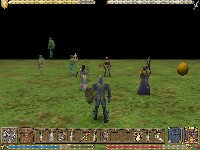| |
Site Navigation
Main
News
Forums
Games
Games Database
Top 100
Release List
Support Files
Features
Reviews
Previews
Interviews
Editorials
Diaries
Misc
Download
Gallery
Music
Screenshots
Videos
Miscellaneous
Staff Members
Privacy Statement
|
|
I had some deeper topics planned for this Side Quest but a lack of time meant I didnít have time to explore and develop the issues. In the meantime, hereís some observations on two games I find an interesting juxtaposition. A lot of partial substantiation and plain olí supposition follows, so please feel free to comment.
The last week or so has seen the Gold announcement for Oblivion and the release of a strategy game called Galactic Civilisations II. Thereís no link between these two whatsoever, so why single them out? Because they represent almost polar opposites in terms of the development and product but both seem likely to be quite successful in their respective markets. They also represent some game elements that we are often told present a barrier to sales.
Oblivion is clearly a massive product, both in terms of scope and development. We donít know what Oblivion cost to make but the size of the team makes it pretty clear it is an expensive development. Itís also the first ďnext-genĒ RPG Ė whatever that means. Barring an unforeseen disaster, itís destined for sales stardom Ė the series is successful, the press has primed it to a fever-pitch and Xbox 360 owners looking for an RPG (and some would say just a decent game to play ;) ) will likely pick it up in large numbers.
Stardockís GalCiv2 probably wonít sell anything like the numbers of Oblivion but it was the best-selling game last week at Walmart (not just best-selling PC strategy game Ė best selling title across all platforms) and the development costs were modest. Of course, the current level of competition is part of this picture but itís pretty amazing to see an indie, turn-based, 4x space strategy title take off so well Ė and they also own a digital download portal, making them a veritable poster-pinup for the theoretical indie developer of the future. To be fair, Stardock is able to fund their game development from their Windows desktop utility software so they are a little different to the average struggling indie game developer.
So, here are some observations Ė and you might see a common thread.
Freeform gameplay is attractive. Itís counter to the thinking that anything too complex sends gamers screaming in fear to the safety of buying Barbie Playhouse but the few well-made open-ended games that are made readily find both audiences and critical acclaim. Clearly many gamers want simple, directed gameplay Ė but many donít.
Stats arenít bad. Oblivion detractors will (rightly) point out the erosion of skills and options since Daggerfall but there is no escaping that Oblivion remains a complex game with a large number of character creation choices, as was Morrowind before it. GalCiv2 pulls no punches in creating a deep and complex strategy game. The next time a game producer insists their cRPG needs to be simplified to find an audience, call them on it. It just isnít true.
Turn-based isnít dead. This is a complex one. The last time I really discussed turn-based games with a developer was soon after the release of Civilisations 3 Ė and they pointed out that the Civilisation franchise is big enough to carry its own. Thatís hard to argue with but if turn-based was the instant kiss of death, would the franchise name alone save it? At this point, GalCiv2 shows it isnít that simple. While GalCiv is obviously building a franchise, the last entry sold a mere 100,000 copies so the early sales trends would suggest a whole new audience is interested in this second entry Ė and itís mostly built on word of mouth because there is no big marketing campaign.
That doesnít prove that the strategy market isnít simply different to cRPGS, of course. But it does indicate to me that audiences are open to turn-based games Ė if they are well made.
Building communities works. A part of GalCivís success is the community they have built. CEO Brad Wardell is well known on several boards and writes a surprisingly frank blog. Their TotalGaming.net portal sells games that are completely devoid of copy-protection Ė not even a CD-check. Obviously, most developers arenít in a position to do this but it shows that community goodwill can produce concrete sales. |
|
|





 Side Quest: Random Ramblings
Side Quest: Random Ramblings